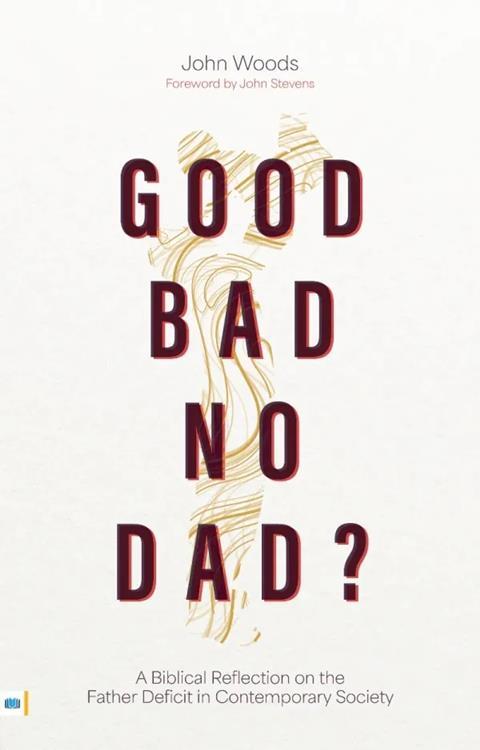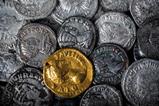Fatherlessness is one of the most damaging yet overlooked issues of our time, says pastor and author John Woods. In Good Bad No Dad, he combines personal experience, biblical insight, and moving testimonies to show how the “father deficit” shapes lives and where true healing can be found.

Deeply personal and pastorally sensitive, Good Bad No Dad (Grace Publications) by John Woods is an excellent book that shines a much-needed light on the often-overlooked pain of fatherlessness.
Around one in two boys aged 15 are not living with both parents, and 90% of those are without their father at home. Even for those who do have fathers present, many experience emotional distance, absence, or even abuse. Others have suffered the loss of their father far too early in life. While there are, of course, many excellent dads, the reality is that a widespread “father deficit” leaves a profound psychological impact on both boys and girls - an impact that is often underrated in our culture.
John Woods never knew who his father was and writes from the intimate understanding of what that absence feels like. As a pastor, he draws on personal experience and powerful extracts from interviews with others to explore the mental health impact of deficient or absent fathers. The consequences, he shows, can be profound. Many describe a deep, aching gap - a sense of disconnection and disorientation, like a constant shadow cast over life. This “father wound” often leaves people with an incomplete sense of identity and belonging, which can spill into a host of struggles: living with a ‘chip on the shoulder,’ becoming overly defensive, or battling a gnawing insecurity. For some, this insecurity manifests as drivenness and perfectionism, desperately seeking to impress a father who is no longer there. For others, it can lead to pursuing relationships or patterns of behaviour in a bid to fill the emotional void.
healing from fatherlessness is ultimately found in our relationship with our heavenly Father
The long-term impact of the two world wars, which killed or traumatised countless men, has left a lasting mark on fatherhood - one that is still felt today. Good Bad No Dad makes it clear that fatherlessness may be one of the most damaging demographic trends of our generation. When men abandon their families, many women are left to shoulder the enormous challenge of raising children alone. Woods argues that much of the destructive behaviour we see in society today can be traced back to this father deficit.

As a pastor, Woods has heart for emotional healing and recognises that the Church has often downplayed or even ignored the fatherhood deficit. Most of his interviewees described the Church’s response as inadequate, and Woods is determined to raise awareness of this issue and point people towards finding ultimate healing in God. A key verse cited by some of his interviewees is Psalm 27:10: ”Though my father and mother forsake me, the Lord will receive me.” Each chapter closes with questions, prayers, and suggested actions that offer pastoral support for readers, though more practical recommendations for church leaders would have been a welcome addition.
Running like a ray of light through the book is the redemptive truth that healing from fatherlessness is ultimately found in our relationship with our heavenly Father. God is the Father who can mend the pain and distress of fatherlessness - the one who is constant, completely trustworthy, and a source of light in the darkness of human failings.
Woods examines examples of fathers in the Bible, reflecting on both the good and the bad. Most Old Testament fathers are portrayed as flawed, with their sins often impacting their children and future generations. The New Testament offers stronger role models, such as Joseph, the adoptive father of Jesus, and the father figure in the parable of the prodigal son. Woods also highlights the Apostle Paul’s spiritual fathering of Timothy, whom he calls “my true son in the faith,” introducing the importance of mentoring as a way to address the father deficit. At their best, good father figures point beyond themselves to the perfect Father we all ultimately long for.
Woods also explores the topic of adoption, showing that far from carrying any cultural stigma, adoption is in no way inferior. He reminds readers that our adoption by God as his children is one of the unique blessings of the gospel. Moving testimonies from adopted individuals illustrate how adoption can redefine identity, bring light into emotional darkness, and offer both family and purpose.
This is a well-researched and deeply helpful book, offering spiritual balm for anyone who has experienced a father deficit. While much has been written in counselling literature on the topic, Woods highlights a significant mental and emotional health issue that has not received enough pastoral attention. Church leaders, in particular, would benefit from reading this book to help shape an ethos and strategy that better serves those wounded by the absence, abuse, or loss of their fathers.
Good Bad No Dad: A Biblical Reflection on the Father Deficit in Contemporary Society by John Woods is out now







































No comments yet